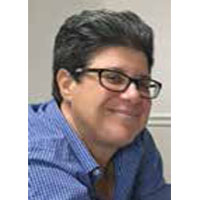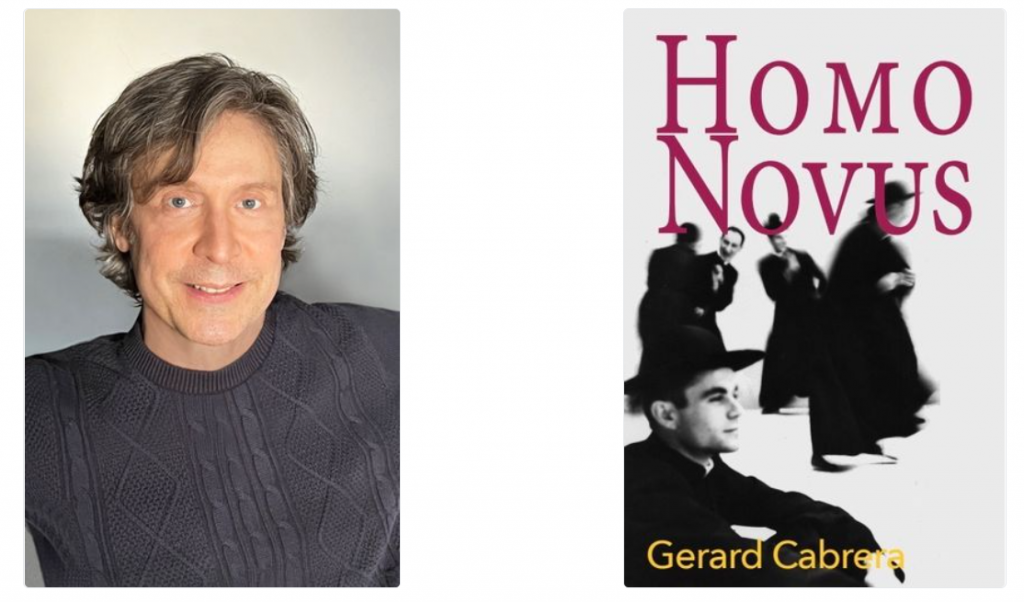
By Michele Karlsberg–
Michele Karlsberg: This year, Gerard Cabrera is celebrating the publication of his debut novel Homo Novus. It tells the story of a young man and the Catholic priest who seduced him when he was an adolescent.
As the publisher’s description of the book reads: “Piety, compassion, lust, love … feelings all the more potent when you are a Catholic priest confined to your hospital bed by an AIDS diagnosis, being comforted by the seminarian you sexually abused as an adolescent. It’s Holy Week 1987. The priest is Fr. Linus Fitzgerald, the young seminarian is Orlando Rosario. Both are shocked and shaken as they reflect on their desires and dreams, secrets and sins, hopes and faith, and the paths that brought them together. In Homo Novus, Gerard Cabrera illuminates with deep empathy and stark emotional honesty the journey these two men take separately and together—a journey that began with a violation of trust and leads them to places, sacred and profane, that they never imagined.”

Recently, I had a chance to speak with Cabrera about his book.
Michele Karlsberg: How did you choose the title of your novel?
Gerard Cabrera: The title was suggested to me by my friend, Philippe Masanet. In the Roman Republic, upon being elected to the Senate, you became homo novus, a new man. Only patrician males could become Senators at first, but when the office was extended to plebeian males, they, too, became new men. Saint Paul, who was a Roman citizen and familiar with Roman civic life, adapted and applied the term as a way to erase hierarchies among converts, to establish a sense of equality among all new Christians. Of course, there is also a play on the use of “homo,” a slur for gay men that the characters all hope to transform into something new and more valuable.
Michele Karlsberg: Should I think of Homo Novus as a story about transformations?
Gerard Cabrera: That’s a terrific question. Certainly, the three main characters in Homo Novus wish to transform themselves. And at the heart of the Catholic mass is the act of transubstantiation, where the bread and wine become literally the body and blood of Jesus. Linus, who is from a white ethnic working-class family, a mix of Irish and other European descent, wants to be an elite, and he wants to overcome his humble roots. The priesthood is a way for him to serve God but also to gain social status and financial security. Orlando is a Puerto Rican kid from a poor family. Likewise, the allure of the priesthood for him is a way to achieve an American dream: success in the eyes of his family and community as well as a shield against racial and ethnic bigotry. Eric, on the other hand, is already an elite, and for him it is about climbing down from his unearned privilege, to become a hero for the dispossessed, with all the pitfalls and rewards that accompany his type of youthful downwardly mobility.
Michele Karlsberg: Let’s talk about sex. Sexual violation, public sex, drunk sex, revenge sex. What was it like to write about it?
Gerard Cabrera: First of all, Homo Novus is about the body as both means and ends—God’s body, the church as the head of the body of Christ, or the body that belongs to Linus, Orlando, or Eric. And so, what I wanted to convey most of all in the sex scenes was the sense of bodies in the moment: surprise, pain, violation, excitement, fulfillment, happiness, love. I wanted to describe the scene as plainly as possible from each character’s center. I felt that if I could do this, I would be doing enough—to watch them watch themselves and then describe their thoughts and feelings at the time.
Michele Karlsberg: Thank you, Gerard. To you and to all here: happy holidays and New Year’s greetings. May 2023 be filled with love, peace, and happiness.
Gerard Cabrera’s fiction has appeared in numerous online and print literary journals. He has attended the Bread Loaf Writers Conference, The Writers Studio, and was awarded a Bread Loaf Camargo Foundation Fellow in Cassis, France. Gerard’s story, “Disorder Under Heaven: The Situation is Excellent,” was nominated for a Pushcart Prize by Apricity Press (Issue 6) in 2021. Gerard earned a degree in English and American Literature at Brandeis University, his Master’s Degree in Public Health from Hunter College, and his law degree from Northeastern University School of Law. He is a Massarican from Springfield, Massachusetts, the birthplace of Dr. Seuss, Dr. Timothy Leary, Absorbine, Jr., basketball, and the first American dictionary. He lives and works in New York City. https://www.gerardcabrera.com
Michele Karlsberg Marketing and Management specializes in publicity for the LGBTQ+ community. This year, Karlsberg celebrates 33 years of successful marketing campaigns. For more information: https://www.michelekarlsberg.com
Words
Published on December 15, 2022
Recent Comments